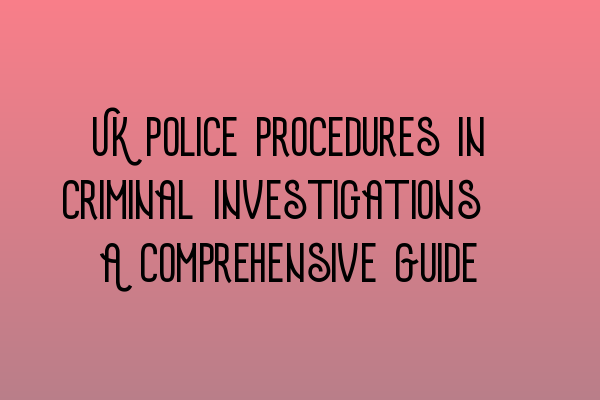UK Police Procedures in Criminal Investigations: A Comprehensive Guide
Welcome to SQE Criminal Law & Practice Law UK, where we provide expert guidance and insights into various aspects of criminal law. In this blog post, we will delve into the intricacies of UK police procedures in criminal investigations. Understanding these procedures is essential for both aspiring legal professionals and individuals seeking justice. So, without further ado, let’s dive in!
Overview of UK Police Procedures
The UK police follow a structured and systematic approach when it comes to criminal investigations. These procedures are designed to ensure fairness, protect the rights of individuals, and gather evidence effectively. Let’s explore the key steps involved:
1. Report of a Crime
Every criminal investigation begins with the report of a crime. This can be done by the victim, witnesses, or any member of the public who becomes aware of the offense. The police will then initiate an investigation based on the information provided.
2. Initial Response
Upon receiving a report, the police will dispatch officers to the scene of the crime. The primary objective of the initial response is to secure the area, provide medical assistance if necessary, and gather preliminary evidence. This stage is critical as it sets the foundation for the entire investigation.
3. Gathering Evidence
Once the initial response is complete, the police will focus on gathering evidence. This may involve conducting interviews, collecting statements from witnesses, securing CCTV footage, and gathering forensic evidence. The evidence collected should be admissible in court and support the prosecution’s case.
At this point, it is important to highlight the role of forensic science in criminal investigations. Forensic techniques such as DNA analysis, fingerprint identification, and ballistics analysis play a crucial role in providing scientific evidence to support or refute allegations.
4. Arrest and Questioning
If sufficient evidence is gathered, the police may proceed to arrest the suspect. The suspect will be informed of their rights and taken to the police station for questioning. The police must follow strict guidelines to ensure fairness and avoid any potential breaches of the suspect’s rights.
During questioning, the suspect has the right to legal representation. This is where qualified criminal defense solicitors play a vital role in protecting the rights of the accused and ensuring a fair and just process. Our team at SQE Criminal Law & Practice Law UK can provide expert legal advice and representation throughout the entire criminal justice process.
5. Charges and Court Proceedings
If the police believe that there is enough evidence to support a prosecution, they will present their case to the Crown Prosecution Service (CPS). The CPS will review the evidence and make a decision on whether to proceed with criminal charges.
If charges are filed, the case will proceed to court. The prosecution and defense will present their arguments, and the judge or jury will make a decision based on the evidence presented. It is crucial to note that the burden of proof lies with the prosecution, and the defendant is presumed innocent until proven guilty.
Ensuring Justice and Fairness
UK police procedures are designed to uphold justice and fairness throughout the criminal investigation process. It is essential to have qualified legal professionals who can navigate these procedures effectively on behalf of both the victims and the accused.
At SQE Criminal Law & Practice Law UK, we offer comprehensive SQE preparation courses for aspiring legal professionals. Our courses provide the knowledge and skills required to excel in criminal law and practice. To supplement your studies, we recommend checking out our related articles:
- SQE 1 Practice Exam Questions
- SQE 1 Practice Mocks FLK1 FLK2
- SQE 2 Preparation Courses
- SQE 1 Preparation Courses
- SRA SQE Exam Dates
By integrating practical exercises, mock exams, and detailed study materials, our courses ensure that you are well-prepared to excel in your legal career.
Conclusion
Understanding UK police procedures in criminal investigations is crucial for aspiring legal professionals and individuals facing criminal charges. By following a structured and fair approach, the police aim to ensure justice prevails.
If you have any further questions or would like to learn more about our SQE preparation courses, feel free to contact us at SQE Criminal Law & Practice Law UK. We are here to help you succeed in the world of criminal law.
